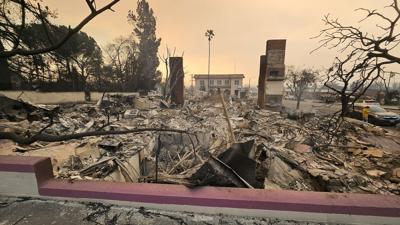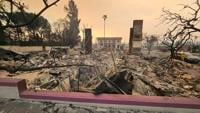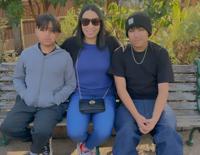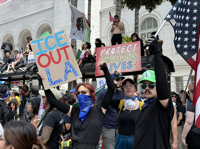
Aftermath of Eaton fire. (Photo by Jacqueline García / CALÓ News)
It has been a month since two of the worst devastating wildfires in California destroyed thousands of residential and commercial properties and killed at least 29 people. The latest numbers show that the Palisades fire burned about 6,800 structures, while the Eaton fire in Altadena burned more than 9,400.
As time passes by, frustration and uncertainty grows among communities because the deadly fires have proven to have an impact across socioeconomic, racial, and ethnic lines. Experts indicate that communities of color, specifically Latinos, face disproportionate risks because of pre-health vulnerabilities, economic challenges and systemic gaps in emergency preparedness and health resources.
Just a few days after the fires started, researchers at the Policy and Politics Institute at UCLA released two reports on how the wildfires affected the Latinos who lived and worked in these areas. Their motivation was to see early coverage in mainstream media focusing on the multi-million dollar homes and not on the Latino families and Latino workers who were also affected.
The first report titled “Wildfires and Latino Communities; Health, Economic, and Preparedness Challenges” revealed that in the first 24 hours of the wildfires, more than 324,000 people were affected.
“[Media] coverage wasn't necessarily reflecting the reality that one in four of these people that were impacted were Latinos,” said Silvia R. González, co-director of research and co-author of the reports.
Latinos’ health and finances were also affected because many of them work in outdoor jobs such as agriculture, construction and landscaping, where the exposure to wildfire smoke poses significant health risks and often disrupts their ability to work. This resulted in lost income.
The study showed that residents of Latino neighborhoods are nearly three times as likely to be employed in these industries, 17% in Latino neighborhoods, compared to 6% in white neighborhoods.
Gonzalez said official numbers are difficult to find in government data because many of these workers are home care workers, gardeners, house cleaners, nannies and others.
“They tend to be part of the informal labor force, and they don't have access to these safety net programs,” she said. “That's why we did a second follow up study to just really focus on the economic impact in terms of job impacts for our community.”
Many Latinos cannot work remotely
The second report titled, “Wildfires and Latino Communities: Analysis of Residents, Workers, and Jobs” revealed that nearly 100,000 jobs were affected and of those, more than a third–36%–were jobs that were held by Latinos. One finding in the Palisades was that while Latinos made up only 7% of the residents they accounted for 34% of the workers coming to that area.
The report also showed the overrepresentation of Latinos in jobs that can’t be done remotely because they require physical presence, such as in the service and retail sectors, and also in manual labor positions. While 22% of white workers in Los Angeles County can work from home, only 7% of Latino can have this option.
Gonzalez said the objective of these reports is to change the public discourse and public perception about who was affected.
“It wasn't just the multi-million dollar homes that were being [affected,] the movie stars, it was everyday people who come and do work in these communities,” she said.
Gonzalez hopes this information can put Latinos at the forefront of the conversation and change the narrative so it doesn’t happen as in the past with COVID-19 when Latinos often were left behind in worker protections and recovery efforts.
She said Latino researchers made these reports for the Latino community and to help create policy solutions that include the experiences and needs of the Latino communities.
“We want to make sure that those who are undocumented in our community also get to benefit from the recovery efforts [because] they pay into taxes, so they should also benefit,” she said.











(0) comments
Welcome to the discussion.
Log In
Keep it Clean. Please avoid obscene, vulgar, lewd, racist or sexually-oriented language.
PLEASE TURN OFF YOUR CAPS LOCK.
Don't Threaten. Threats of harming another person will not be tolerated.
Be Truthful. Don't knowingly lie about anyone or anything.
Be Nice. No racism, sexism or any sort of -ism that is degrading to another person.
Be Proactive. Use the 'Report' link on each comment to let us know of abusive posts.
Share with Us. We'd love to hear eyewitness accounts, the history behind an article.